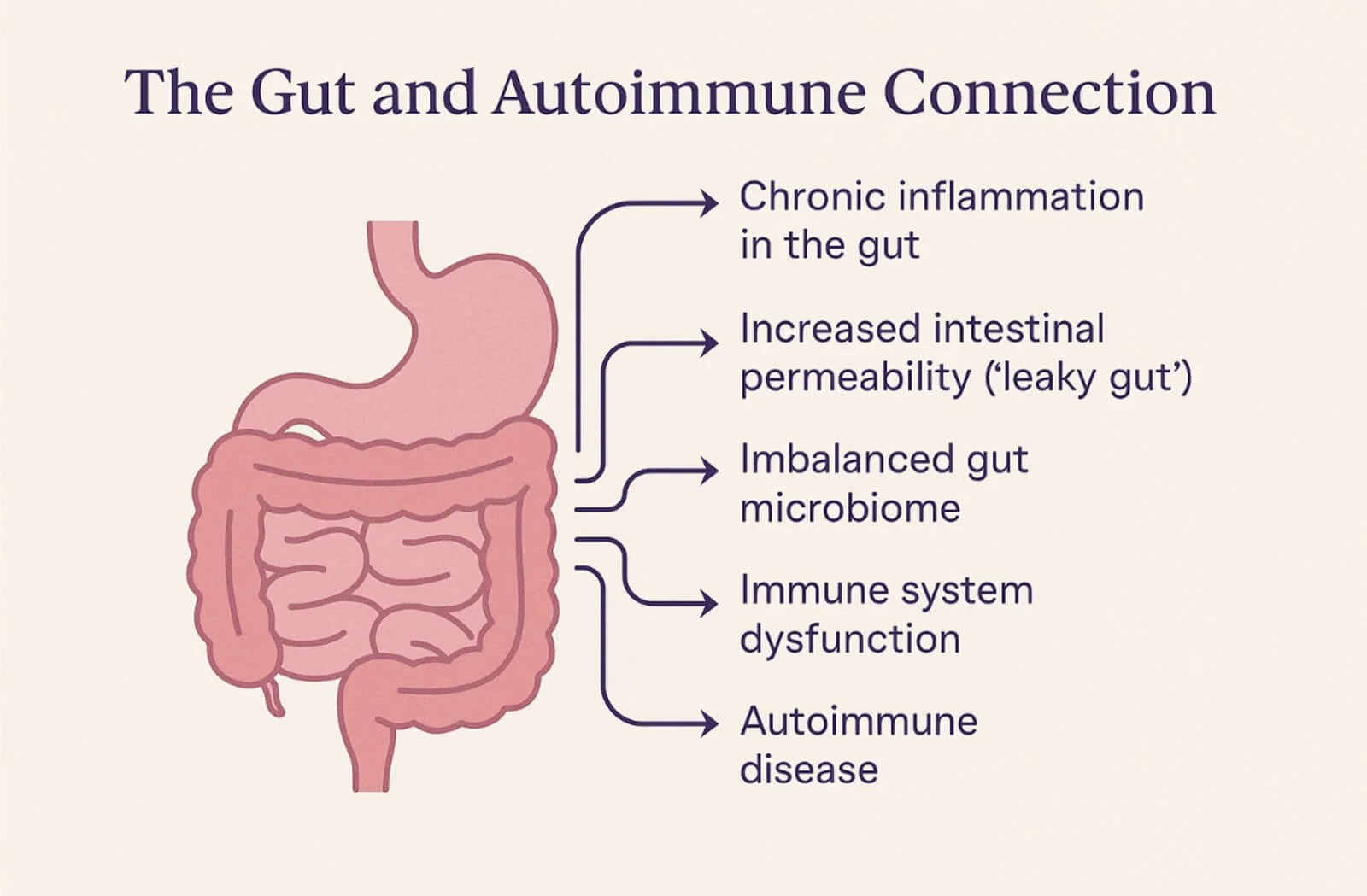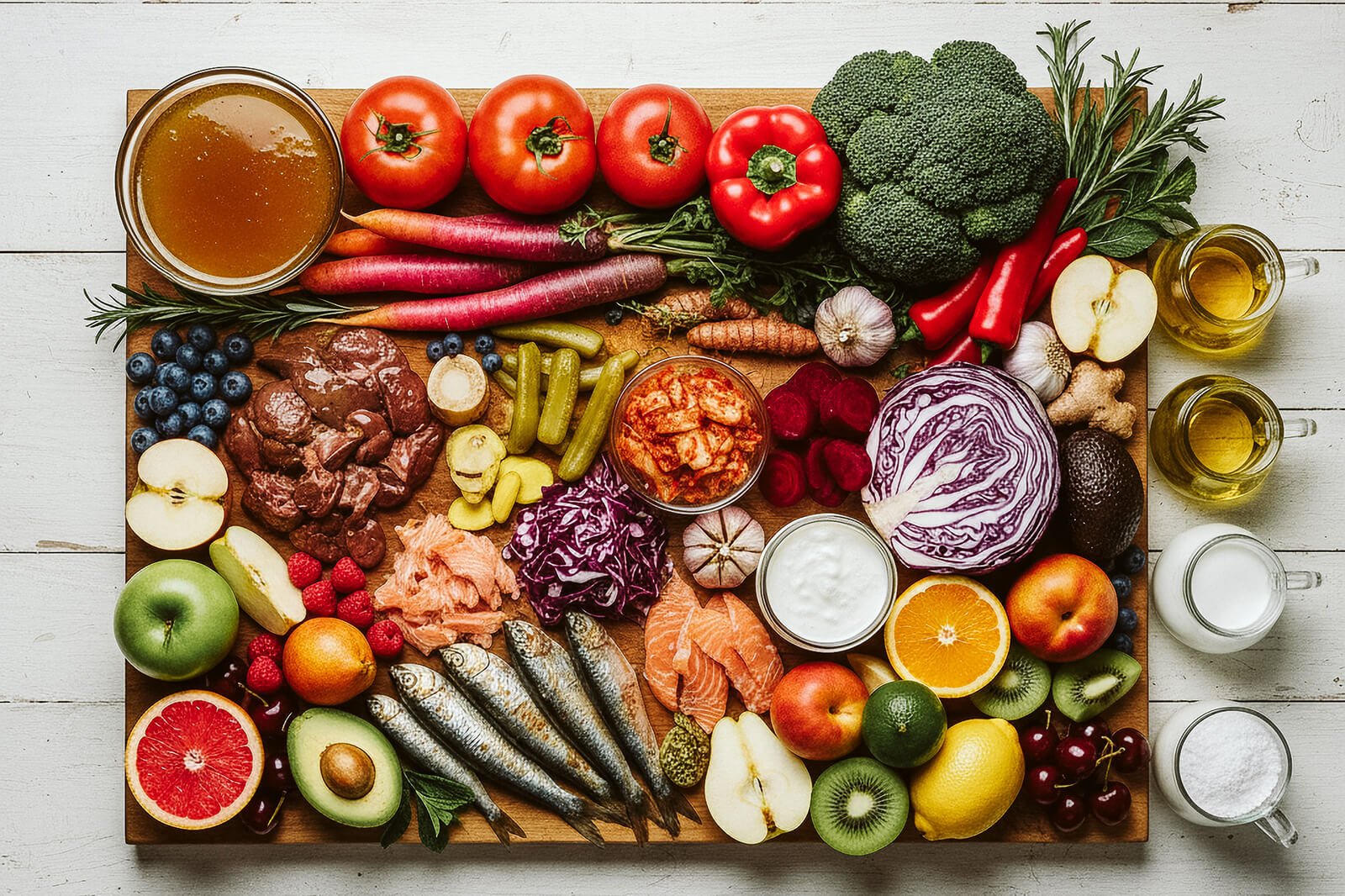Autoimmune, Inflammation & the Gut: What Is The Autoimmune Protocol Diet (AIP Diet) And How Could It Help You Heal?
If you’ve been diagnosed with one or more autoimmune conditions or have been experiencing fatigue, brain fog, joint pain, skin issues, or unexplained gut symptoms, you may have encountered the Autoimmune Protocol, or AIP Diet.
This diet plan is more than just a wellness trend; it is a structured nutritional strategy designed to calm the immune system, reduce inflammation, and support gut healing. These elements are crucial for managing autoimmune diseases.
At Lantern Clinic, we implement the AIP diet selectively and strategically. It is not a permanent solution or a miracle cure, but in the right context, it can serve as a powerful tool for healing.
Research on the AIP diet suggests that it may help people with autoimmune disorders by focusing on whole foods and avoiding inflammatory triggers. The diet is similar to the Mediterranean diet in its emphasis on nutrient-dense, anti-inflammatory foods. By following the AIP diet, individuals can manage their autoimmune conditions effectively and improve their overall health.
In summary, the AIP diet aims to reduce symptoms of autoimmune diseases through a carefully structured meal plan that prioritises healing and well-being.
If you’re wondering whether the AIP diet could be a good fit for your healing journey, our doctors can help you explore it in a safe and supportive way.
What Is the AIP Diet (Autoimmune Protocol Diet)?
The Autoimmune Protocol Diet is a therapeutic version of the Paleo diet, originally developed by researchers and clinicians in the ancestral health and functional medicine communities.
This diet is designed to help individuals with autoimmune conditions by focusing on eliminating foods that are commonly associated with immune reactivity and gut inflammation.
The AIP diet consists of an elimination phase, where certain foods are removed from your diet to help identify triggers that may contribute to the symptoms of autoimmune diseases. This elimination phase of the aip diet is specifically aimed at reducing inflammation and managing autoimmune response.
Food types in the elimination stage may include:
Gluten and grains
Dairy
Legumes
Nightshades (e.g. tomatoes, peppers, aubergines)
Nuts and seeds
Industrial seed oils
Refined sugar and food additives
After the elimination phase of the AIP, you can gradually reintroduce foods into your diet to see how they affect your condition.
It also emphasises:
Nutrient-dense, anti-inflammatory foods
High-quality proteins, organ meats, and bone broth
Fermented vegetables and gut-healing foods
Lifestyle practices that reduce stress and improve sleep
Importantly, the AIP Diet includes a reintroduction phase, where eliminated foods are gradually brought back in based on individual tolerance and healing progress.
The Gut-Autoimmune Connection
Did you know that over 70% of your immune system is located in your gut?
The gut lining is meant to be a selective barrier, allowing nutrients in and keeping inflammatory compounds out. But chronic stress, processed food, infections, medications, and toxic exposures can all damage this lining, leading to a condition known as intestinal permeability or "leaky gut".
In people with autoimmune conditions, a leaky gut may allow undigested food particles, bacteria, and toxins to enter the bloodstream, triggering the immune system to attack what it sees as invaders.
Sometimes, it even begins to attack the body's own tissues, causing inflammation and damage over time. Conditions linked to this process include:
Hashimoto’s thyroiditis
Coeliac disease
Rheumatoid arthritis
Psoriasis and eczema
Multiple sclerosis
Ulcerative colitis and Crohn’s disease
Inflammatory Bowel Disease
If you suspect your gut health may be influencing your symptoms, we can guide you through testing and personalised steps to restore balance.
Schedule an initial consultation with our team
Why the Autoimmune Protocol Diet Can Help
By removing common immune triggers and lowering gut inflammation, the AIP Diet creates an environment where healing can begin:
The elimination diet phase of the AIP diet focuses on eliminating foods that may trigger an autoimmune response, allowing the gut lining a chance to repair itself. By doing so, it reduces systemic inflammation and helps manage autoimmune conditions.
Many people with autoimmune disorders report a decrease in symptom flare-ups, alongside improvements in energy levels, skin health, digestion, joint pain, and mental clarity, often noticing positive changes within just 4 to 6 weeks of following the AIP diet.
However, it’s important to remember that the diet is not solely about food. The most effective AIP plans often incorporate a balanced approach, including functional testing, targeted supplementation, nervous system support, and regular clinical monitoring to further enhance the efficacy of the autoimmune protocol.
By carefully reintroducing different foods back into your diet after the initial elimination phase, you can identify which specific items might be contributing to your autoimmune symptoms, ultimately helping you to manage your autoimmune condition more effectively.
How long do I need to follow the AIP?
The duration for following the AIP diet can vary depending on individual health goals and the severity of autoimmune symptoms. Initially, it is recommended to stay on the elimination diet for about 30 to 90 days, allowing the body to heal and inflammation to reduce. During this first phase of the AIP, foods from the diet that are not allowed are eliminated, which helps identify potential triggers for autoimmune disease symptoms.
After this initial phase, individuals may begin to reintroduce new foods gradually while monitoring their body's reactions. This reintroduction process is crucial for understanding how different foods may affect autoimmune patients. Ultimately, the length of time spent on the AIP diet may vary, but many find that following the diet in people with rheumatoid arthritis or similar conditions helps manage symptoms effectively over the long term.
What Can You Eat on the AIP Diet?
The AIP diet is designed to help individuals manage autoimmune conditions by eliminating foods that may trigger inflammation and instead promoting nutrient-dense foods in your diet.
Below is a list of food types that are encouraged while following the AIP diet.
Organic vegetables to reduce toxin exposure and support detox pathways
Quality meats, including grass-fed organ meats and offal for nutrient density
Bone broth is rich in gelatin and glutamine to help seal the gut lining
Wild-caught fish and shellfish, especially omega-3-rich options like sardines, anchovies, and salmon
Fermented foods and probiotic-rich foods such as kimchi, beetroot, cabbage, garlic, kefir (preferably coconut or water-based)
Low glycaemic fruits, ideally paired with fat or protein to slow sugar absorption
Healthy fats, including extra virgin olive oil, avocado oil, and coconut oil
Herbs and spices (avoiding nightshades): rosemary, thyme, turmeric, garlic, ginger, and mint
Why a Holistic Intervention Matters
Autoimmune conditions rarely affect just one organ. In many cases, they impact the gut, thyroid, skin, joints, hormones, and even the brain. That’s why an effective intervention must address more than just food.
At Lantern Clinic, we consider:
Sleep quality and circadian rhythm support
Stress reduction and nervous system regulation
Hormone balancing, including thyroid and adrenal function
We look at the bigger picture and connect the dots, rather than treating each symptom or body part in isolation. This is where working with a functional medicine doctor can be incredibly valuable.
A skilled clinician can bring together the best of both worlds, conventional medical tools and diagnostics, alongside holistic strategies and lifestyle interventions. The AIP Diet may be one of the most effective first steps, but it works best when integrated into a thoughtful, whole-person approach.
Our Doctor-Led Functional Medicine Approach at Lantern Clinic
As functional medicine practitioners, we never take a "one-size-fits-all" approach. We use the AIP Diet when it’s clinically appropriate, not as a blanket recommendation.
For patients dealing with long-standing autoimmune symptoms, autoimmune flares, or unexplained fatigue, an AIP Diet plan can be considered as part of a therapeutic roadmap that includes:
Personalised dietary guidance
Gut microbiome testing and support
Hormone and cortisol assessment
Gentle detox and immune regulation
We've used this framework successfully in patients with Hashimoto's, rheumatoid arthritis, psoriasis, PCOS with autoimmune overlap, long COVID, and more.
Final Thoughts: Food as Medicine, Not Perfection
We don’t believe in extreme diets or punishing restriction. But we do believe that food, when used strategically and supportively, can be deeply healing.
The AIP Diet, or Autoimmune Protocol Diet, isn’t about perfection; instead, it serves as a structured approach to assist individuals in managing autoimmune conditions. This diet is designed to create a reset, providing your gut, immune system, and hormones a calmer environment, allowing your body to heal naturally.
If you’ve been living with chronic symptoms or an autoimmune diagnosis, and you’re curious about whether the AIP Diet may help you on your recovery journey, it’s essential to consult with a clinician who understands how to apply this anti-inflammatory diet intelligently, compassionately, and holistically.
At Lantern Clinic, we guide people with autoimmune diseases through the phases of the AIP diet, ensuring that the foods you reintroduce are nutrient-dense and supportive of your health goals.
Ultimately, the AIP diet aims to reduce the symptoms of autoimmune diseases by allowing individuals to identify certain foods that may be causing adverse reactions and helping them make informed choices about what foods to include in their diet going forward.
If you’ve been living with ongoing symptoms and are ready for a more compassionate, structured, whole body approach, our team is here to guide you. Book a free discovery call today and take the next step toward your personalised recovery plan.


